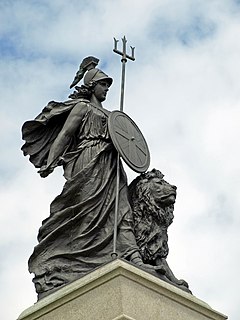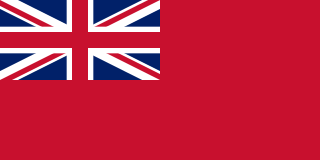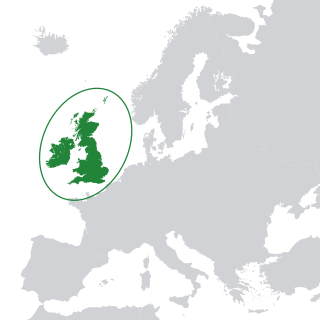
The British Isles are a group of islands in the North Atlantic off the north-western coast of continental Europe, consisting of the islands of Great Britain, Ireland, the Isle of Man, the Hebrides and over six thousand smaller islands. They have a total area of 315,159 km2 (121,684 sq mi) and a combined population of almost 72 million, and include two sovereign states, the Republic of Ireland, and the United Kingdom of Great Britain and Northern Ireland. The Channel Islands, off the north coast of France, are sometimes taken to be part of the British Isles, even though they do not form part of the archipelago.

The United Kingdom of Great Britain and Northern Ireland, commonly known as the United Kingdom, or Britain, is a sovereign country in north-western Europe, off the north-western coast of the European mainland. The United Kingdom includes the island of Great Britain, the north-eastern part of the island of Ireland, and many smaller islands within the British Isles. Northern Ireland shares a land border with the Republic of Ireland. Otherwise, the United Kingdom is surrounded by the Atlantic Ocean, with the North Sea to the east, the English Channel to the south and the Celtic Sea to the south-west, giving it the 12th-longest coastline in the world. The Irish Sea separates Great Britain and Ireland. The total area of the United Kingdom is 94,000 square miles (240,000 km2).

The Union Jack, or Union Flag, is the national flag of the United Kingdom. The flag also has official status in Canada, by parliamentary resolution, where it is known as the Royal Union Flag. Additionally, it is used as an official flag in some of the smaller British overseas territories. The Union Flag also appears in the canton of the flags of several nations and territories that are former British possessions or dominions, as well as the state flag of Hawaii. The claim that the term Union Jack properly refers only to naval usage has been disputed, following historical investigations by the Flag Institute in 2013.

Britannia is the Latin name of Britain. The word has been used in several different senses, including that of the national personification of the United Kingdom. The name is a Latinisation of the native Brittonic word for the island, Pretanī, which also produced the Greek form Prettanike or Brettaniai, which originally, in the fourth to the first centuries BC, designated a collection of islands with individual names, including Albion or Britain. In Modern Welsh the name remains Prydain. By the 1st century BC, Britannia came to be used for Great Britain specifically. After the Roman conquest in 43 AD, Britannia meant Roman Britain, a province covering the island south of Caledonia. When Roman Britain was divided into four provinces in 197 AD, two were called Britannia Superior and Britannia Inferior. Britannia is the name given to the female personification of the island, and it is a term still used to refer to the whole island.

The flag of England is derived from Saint George's Cross. The association of the red cross as an emblem of England can be traced back to the Late Middle Ages, and it was increasingly used alongside the Royal Banner in the wake of the English Reformation, especially as a maritime flag. It was used as a component in the design of the Union Jack in 1606.

The flag of Scotland consists of a white saltire defacing a blue field. The Saltire, rather than the Royal Standard of Scotland, is the correct flag for all private individuals and corporate bodies to fly. It is also, where possible, flown from Scottish Government buildings every day from 8:00 am until sunset, with certain exceptions.

The Red Ensign or "Red Duster" is the civil ensign of the United Kingdom of Great Britain and Northern Ireland. It is one of the British ensigns, and it is used either plain or defaced with a badge or other emblem, mostly in the right half.

The national flag of the United Kingdom is the Union Jack, also known as the Union Flag.

The royal arms of England are the arms first adopted in a fixed form at the start of the age of heraldry as personal arms by the Plantagenet kings who ruled England from 1154. In the popular mind they have come to symbolise the nation of England, although according to heraldic usage nations do not bear arms, only persons and corporations do. The blazon of the arms of Plantagenet is: Gules, three lions passant guardant in pale or armed and langued azure, signifying three identical gold lions with blue tongues and claws, walking past but facing the observer, arranged in a column on a red background. Although the tincture azure of tongue and claws is not cited in many blazons, they are historically a distinguishing feature of the arms of England. This coat, designed in the High Middle Ages, has been variously combined with those of the Kings of France, Scotland, a symbol of Ireland, the House of Nassau and the Kingdom of Hanover, according to dynastic and other political changes occurring in England, but has not altered since it took a fixed form in the reign of Richard I of England (1189–1199), the second Plantagenet king.
This glossary of names for the British include nicknames and terms, including affectionate ones, neutral ones, and derogatory ones to describe British people, and more specifically English, Welsh, Scottish and Northern Irish people. Many of these terms may vary between offensive, derogatory, neutral and affectionate depending on a complex combination of tone, facial expression, context, usage, speaker and shared past history. When hearing British speakers talk amongst themselves it is wise not to assume that terms marked as offensive are being used as such however, just because the speakers use such terms amongst or about themselves, do not assume that the same words from others will be accepted in the same way.

West Brit, an abbreviation of West Briton, is a derogatory term for an Irish person who is perceived as being anglophilic in matters of culture or politics. West Britain is a description of Ireland emphasising it as under British influence.

The terminology of the British Isles refers to the words and phrases that are used to describe the geographical and political areas of the islands of Great Britain, Ireland and the smaller islands which surround them. The terms are often a source of confusion, partly owing to the similarity between some of the actual words used but also because they are often used loosely. Many of the words carry geographical and political connotations which are affected by the history of the islands.

North Britain is a term which has been occasionally used, particularly in the 17th and 18th centuries, for either the northern part of Great Britain or Scotland, which occupies the northernmost third of the island. Its counterparts were South Britain, generally used to refer to England and Wales and West Britain, usually referring to Ireland.

Great Britain is an island in the North Atlantic Ocean off the northwest coast of continental Europe. With an area of 209,331 km2 (80,823 sq mi), it is the largest of the British Isles, the largest European island, and the ninth-largest island in the world. The island is dominated by a maritime climate with narrow temperature differences between seasons. The 60% smaller island of Ireland is to the west – and together these islands, along with over 1,000 smaller surrounding islands and named substantial rocks, form the British Isles archipelago.

The formation of the United Kingdom of Great Britain and Northern Ireland has involved personal and political union across Great Britain and the wider British Isles. The United Kingdom is the most recent of a number of sovereign states that have been established in Great Britain at different periods in history, in different combinations and under a variety of polities. Norman Davies has counted sixteen different states over the past 2,000 years.

The following outline is provided as an overview of and topical guide to the United Kingdom of Great Britain and Northern Ireland; a sovereign state in Europe, commonly known as the United Kingdom (UK), or Britain. Lying off the north-western coast of the European mainland, it includes the island of Great Britain—a term also applied loosely to refer to the whole country—the north-eastern part of the island of Ireland and many smaller islands
The name Britain originates from the Common Brittonic term *Pritanī and is one of the oldest known names for Great Britain, an island off the north-western coast of continental Europe. The terms Briton and British, similarly derived, refer to its inhabitants and, to varying extents, the smaller islands in the vicinity. "British Isles" is the only ancient name for these islands to survive in general usage.

The English people are an ethnic group and a nation native to England, who speak the English language of the Germanic language family and share a common history and culture. The English identity is of early medieval origin, when they were known in Old English as the Angelcynn. Their ethnonym is derived from the Angles, one of the Germanic peoples who migrated to Great Britain around the 5th century AD. England is the largest and most populous country of the United Kingdom of Great Britain and Northern Ireland.

The British people, or Britons, are the citizens of the United Kingdom of Great Britain and Northern Ireland, the British Overseas Territories, and the Crown dependencies. British nationality law governs modern British citizenship and nationality, which can be acquired, for instance, by descent from British nationals. When used in a historical context, "British" or "Britons" can refer to the Celtic Britons, the indigenous inhabitants of Great Britain and Brittany, whose surviving members are the modern Welsh people, Cornish people, and Bretons. It also refers to citizens of the former British Empire, who settled in the country prior to 1973, and hold neither UK citizenship nor nationality.

The following is an alphabetical list of articles related to the United Kingdom of Great Britain and Northern Ireland.











